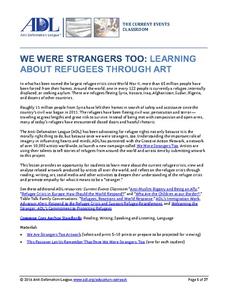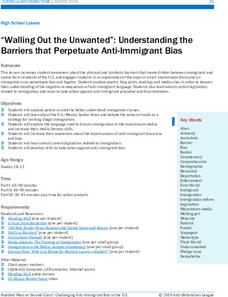Anti-Defamation League
Impact of the U.S. Expansion on Indigenous People and Stereotypes About Native American People
The 2004 U.S. bicentennial sparks a discussion about its meaning and importance to United States history. Readings, maps, tables, and reflective writing prompt small groups to explore the westward expansion, Lewis and Clark, and how...
Anti-Defamation League
Representing the People: Diversity and Elections
After studying statistics and reading articles about diversity in the 2018 through 2020 U.S. elections, young social scientists discuss what they believe is the impact of having more diverse elected officials. Individuals then select one...
Anti-Defamation League
Women’s Inequity in Pay: Could It Be Sexism, Implicit Bias or Both?
Equal pay for equal work? High schoolers research the reasons for the inequity in women's pay. They read articles, examine graphs, engage in discussion, and then craft an essay in which they suggest a way to address the gender wage gap.
Anti-Defamation League
What are Reparations and Should We Enact Them?
Young social scientists investigate recent legislative proposals for reparations for African Americans. They examine the rationale behind the proposals by viewing videos and reading related articles. To close the instructional activity,...
Anti-Defamation League
Pink Collar Jobs: Gender Segregation and Pay Inequality in the Workplace
Cartoons showing women in the workplace spark a discussion about being a business executive and claiming the corporate ladder. Small groups analyze data and create graphs that display essential information from the handouts. The class...
Anti-Defamation League
Major League Baseball and the Negro Leagues: Correcting an Injustice
It's been a long time coming! In 2020, MLB Commissioner Robert D. Manifred, Jr. stated that "the Negro Leagues would be recognized as official major leagues." Middle schoolers investigate the history of the Negro Leagues and use evidence...
Anti-Defamation League
Intent vs. Impact: Why Does it Matter?
Contrary to the popular saying, words can hurt. Words matter! Tweens and teens can reflect on how words impact others even if the intent wasn't how the words were perceived. After examining an Instagram post where Lizzo apologized for...
Anti-Defamation League
Emojis and Me
A lesson features the work of O'Plérou Grebet, a graphic designer who created a collection of emojis to represent his life in West Africa. Scholars explore the history and purpose of emojis, then read and discuss an article about...
Anti-Defamation League
Lonnie Chavis of 'This Is Us' Writes about Racism
Scholars read and discuss an essay by 12-year-old actor Lonnie Chaves about racism, paying close attention to how racism presents itself in interpersonal and institutional ways. Learners reflect on how they experience or witness racism...
Anti-Defamation League
Sneakers and Prejudice: Letters to Challenge Bias
After learning that NBA player Stephen Curry's shoes only come in boys' sizes, Riley wrote a letter sharing her concern, highlighting the gender bias and inviting Curry to take action. Scholars view a news clip, review the letters,...
Anti-Defamation League
We Were Strangers Too: Learning About Refugees Through Art
Did you know that "in the largest refugee crisis since World War II, more the 64 million people have been forced from their homes"? The Anti-Defamation League presents an activity that asks class members to examine a series of artworks...
Anti-Defamation League
Analyzing Primary Source Documents to Understand U.S. Expansionism and 19th Century U.S.-Indian Relations
Historical events can be viewed from multiple perspectives. This simple truth is brought home in a lesson plan that examines primary source documents related to the Lewis and Clark Expedition, the Doctrine of Discovery and Manifest...
Anti-Defamation League
Viewing History from Multiple Perspectives
Celebration or protest song? The full text of Woody Guthrie's "This Land is Your Land" opens a study of the Lewis and Clark Expedition, the Louisiana Purchase, and Western Expansion from various perspectives. Middle schoolers examine...
Anti-Defamation League
Dealing with the Social Pressures that Promote Online Cruelty
Why do people engage in cyberbullying? What can be done about it? These are the questions middle schoolers consider in a very timely lesson plan. Participants view PSA announcements, read a case study, and participate in scenarios...
Learning for Justice
Looking Closely at Ourselves
A thoughtful discussion about self-reflecting leads to a conversation about skin color and making a list of words associated with "beauty." Budding artists use a mirror to examine their features and create a self-portrait. Peers critique...
Anti-Defamation League
Don't Let Hate Ruin the Fun: Youth and Online Games
Gamers unite! Take action against bullying and hate speech in online video games! After reading data that reveals the extent to which various age groups experience hate and, or harassment while playing video games online, groups develop...
Anti-Defamation League
Hair Discrimination and the CROWN Act
The CROWN Act (Creating a Respectful and Open World for Natural Hair) is the subject of the lesson that asks groups to research the stories of five different women and share their insights in a jigsaw activity. Participants then craft...
Anti-Defamation League
Cyberbullying and Online Cruelty: Challenging Social Norms
"Everybody does it!" is often the clarion call to justify cyberbullying. Here's a lesson plan that encourages high schoolers to challenge these behaviors. Participants examine images, watch videos, and engage in discussions designed to...
Anti-Defamation League
Understanding and Analyzing “The U.S. of Us” by Richard Blanco
Current immigration issues and the rhetoric surrounding the controversies come into focus with a lesson that uses Richard Blanco's anthem, "The U.S. of Us," written after the August 2019 attack in El Paso, Texas, to open a discussion of...
Anti-Defamation League
“Walling Out the Unwanted”: Understanding the Barriers that Perpetuate Anti-Immigrant Bias
As part of a study of immigrant bias, high schoolers investigate the language used in blogs, readings, media reports, and current legislation whose language perpetuates xenophobia. They then consider ways they can get involved in...
Anti-Defamation League
“They Don’t Know Me”: Exposing the Myths and Establishing the Facts about Immigration
Middle schoolers engage in a lesson plan that teaches them to distinguish myths from facts about United States immigration. Class members take an immigration quiz, watch a "What Would You do" video, and discuss how they could be an ally...
Anti-Defamation League
‘Migrant Caravan’ and the People Seeking Asylum
The controversies surrounding migrants seeking asylum in the U.S. have recently been a hot topic. To understand some of the issues involved, young scholars investigate the Migrant Caravans of 2018. A 10-page packet, including photos, a...
Anti-Defamation League
"What is it Like to be an Outsider?”: Building Empathy for the Experiences of Immigrants
This lesson highlights the struggles of immigrants and the importance of showing empathy. Beginning with a read-aloud of a book in another language and a poem, scholars take part in a thoughtful discussion. Then, the class examines a...
Anti-Defamation League
On-Screen Diversity: Why Visibility in Media Matters
Characters play a significant role in why we like certain shows and movies but are the characters we watch representing the diverse society in which we live? Scholars examine this question through thoughtful discussion about popular...

























